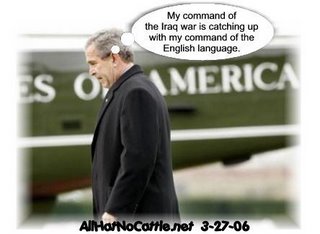| By Imad Khadduri Below are three articles. The first two are serious and highly commendable reading. "Since 9 April 2003, the US has been trying to foment sectarian tendencies. This may explain the tensions we see today. Doctrinal differences within Islam were never a big deal. Islam is open to many interpretations after all. Shias and Sunnis are more united by religion than divided by interpretation. Islam has also been a uniting force for Kurds and Arabs. This is not something that occupiers wished to encourage. The occupiers adopted a policy of divide and rule. The US had only one post-war scenario, and it was based on pitting Sunni against Shia.
The moment the occupation was complete, the countdown to civil war began. The media spoke of parallels between Lebanon and Iraq. And every single incident in the country was portrayed as having sectarian origins. Meanwhile, the country became a stage for account settling. Anyone with an axe to grind -- Iran, Syria, Al-Qaeda, to mention just a few -- got involved. Israel, many claim, has been involved in the assassination of the country's top professionals.
As the violence spread, it became harder to draw the line between legitimate resistance and acts of wilful mayhem. Terrorists chose their targets in cold blood. Their aim was to divide the Iraqis, to drive a wedge between Sunni and Shia, and to bring the country to its knees. The turbulence in Al-Madaen and the bombings of the Shia mausoleums were not random acts; people who don't want the Iraqis to remain united carefully planned them.
Do we have a civil war in Iraq? To this moment, the answer is no. Rampant violence? Yes. Innocent victims? Certainly. Political vacuum? Without doubt. But no civil war. Iraqi politics is being mishandled, for our politicians have so far failed to step up to their responsibilities. Iraq needs leaders who can reassure the public and keep the nation together. Neighbours can help by encouraging unity rather than sedition. The US has taken us down a road of sectarian strife and now its troops are standing by, waiting to see what's next. This doesn't look good. The scene of political division is quite alarming. The scene of leaders jockeying for power is actually dismal. It's been two months since the elections, and yet we cannot get a government together.What we have in this country is not civil war, but a lack of credible leadership. We all are aware of the plots against our country, and some of our best minds have already advised caution and restraint. What we need to do is defuse the situation. We know that regional and international powers are trying to divide us, and we need to prove them wrong. We need to rebuild this country. We can do it. We can present an Iraqi model, just as the Americans said. We can offer a model of democracy, freedom and human rights. It's all up to us." Divide and rule by Sawsan Al-Assaf 16 - 22 March 2006 "Is Iraq heading toward disintegration? The question is asked frequently by observers, never mind their attitude toward Iraq and Iraqis. The question implies more fundamental ones: is Iraq an artificial state? Or is it built on certain necessary foundations? If these foundations are no longer valid, should Iraq disintegrate?Iraq as a state and a civilization has existed well back in history. Deep-rooted civilizations, be they in the north, middle or south, came into being not because some power interest required them to but as a result of natural evolution. Even in modern history, when the Ottoman Empire introduced the villayet system it could not separate the three villayets of Mosul, Baghdad and Basra. Indeed, the British occupation formed the new Iraqi state according to these lines after cutting out some of its territories. One should remember that after signing the Sykes-Picot treaty, the British found that it was not realistic and changed their minds. This was not an accidental decision. The British strategists and political officers who controlled Iraq found that for economic and strategic reasons Iraq should be formed in the way it was. They realized that the north of Iraq could not subsist without the riches of the south and the south could not be defended without the natural boundaries of the north. I believe all these factors are still valid today. ......." Not because of our blue eyes by Saad N. Jawad, March 30, 2006 And the third one fits the Arabic proverb: "The worst aspect of a tragedy .. is that it induces humor شرّ البلية ما يُـضحِك" "So, who’s responsible for the current violence in Iraq? Who’s responsible for Americans’ disdain of the war? Depends on who you talk to. Rumsfeld blames the U.S. press for not reporting more happy stories. Cheney cites the Iraq-al Qaeda connection which led up to 9/11 to justify the invasion. (He’s obviously been inhaling gunpowder, again.) Perhaps Bush has the freshest take on who to pin the blame on: Saddam Hussein. Ayup. This is all Saddam’s fault. Speaking, last week, before Freedom House, Bush was delusional even by his standards. “The enemies of a free Iraq are employing the same tactics Saddam used, killing and terrorizing the Iraqi people in an effort to foment sectarian division,” Bush declared.
Uh, no. But, oh, Hell. The facts be damned.
“Iraq is a nation that is physically and emotionally scarred by three decades of Saddam’s tyranny,” Bush felt compelled to blurt.
Bush put rose-colored glasses on his “straw-man” argument and let ‘er rip: “Today, some Americans ask whether removing Saddam caused the divisions and instability we’re now seeing. In fact, much of the animosity and violence we now see is the legacy of Saddam Hussein. He is a tyrant who exacerbated sectarian divisions to keep himself in power. Iraq is a nation with many ethnic and religious and sectarian and regional and tribal divisions. Before Saddam Hussein, Iraqis from different communities managed to live together. Even today, many Iraqi tribes have both Sunni and Shia branches. And in many small towns with mixed populations, there’s often only one mosque where Sunni and Shia worship together. Intermarriage is also common with mixed families that include Arabs and Kurds and Sunnis and Shia and Turkmen, Assyrians, and Chaldeans.”
He’s been reading “The Arabian Nights” again as history.
Although he admitted “The kidnappings and brutal executions and beheadings are very disturbing,” (‘ya think?) he thought we were making great progress.
Then, assuming the role of School Marm-in-Chief, he admonished the current Iraqi government: “I want the Iraqi people to hear I’ve got great confidence in their capacity to self govern,” Bush said. “I also want the Iraqi people to hear — it’s about time you get a unity government going. In other words, Americans understand you’re newcomers to the political arena. But pretty soon its time to shut her down and get governing (sic). .....” Sugar plumbs and depleted uranium March 31, 2006 See the videos on " shutting her down ", and the top ten of Bush's pearls of wisdom   | | | | |


No comments:
Post a Comment